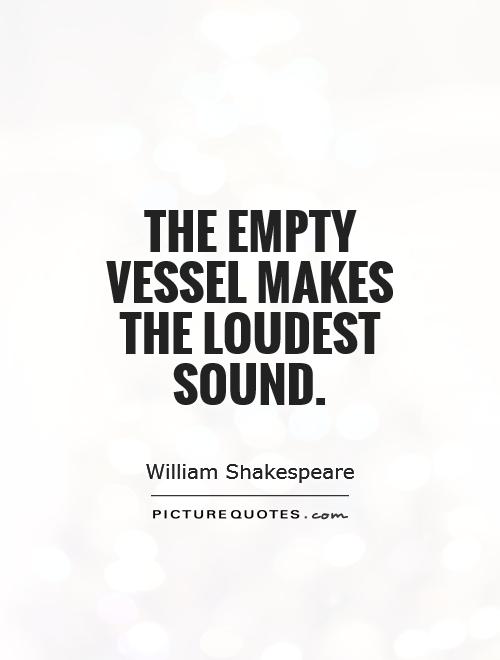The empty vessel makes the loudest sound

The empty vessel makes the loudest sound
In the context of William Shakespeare, the phrase "The empty vessel makes the loudest sound" can be interpreted in various ways. One possible interpretation is that those who lack substance or depth are often the ones who are the most vocal or boastful. This idea is reflected in many of Shakespeare's plays, where characters who are insecure or lacking in true virtue often resort to loud and boastful behavior to compensate for their shortcomings.One of the most famous examples of this theme can be found in Shakespeare's play "Macbeth." In this tragedy, the character of Lady Macbeth is a prime example of an empty vessel making the loudest sound. Lady Macbeth is consumed by ambition and a desire for power, but lacks the moral fortitude and inner strength to achieve her goals in a noble or honorable way. Instead, she resorts to manipulation, deceit, and ultimately murder to achieve her ambitions. Throughout the play, Lady Macbeth's words are often loud and forceful, but they ultimately reveal her inner emptiness and lack of true substance.
Another example of this theme can be found in Shakespeare's play "Othello." In this tragedy, the character of Iago is a master manipulator who uses his words and actions to sow discord and chaos among the other characters. Despite his lack of moral integrity and his deceitful nature, Iago is able to manipulate those around him through his cunning words and false promises. Like an empty vessel, Iago's words are loud and persuasive, but ultimately reveal his lack of true virtue and integrity.
Overall, the phrase "The empty vessel makes the loudest sound" can be seen as a cautionary tale in Shakespeare's works. Characters who lack true substance or virtue may be able to make a lot of noise and create chaos in the world, but ultimately their lack of inner strength and integrity will be their downfall. Shakespeare's plays serve as a reminder that true greatness comes from within, and that those who are truly virtuous and noble do not need to resort to loud and boastful behavior to prove their worth.












 Friendship Quotes
Friendship Quotes Love Quotes
Love Quotes Life Quotes
Life Quotes Funny Quotes
Funny Quotes Motivational Quotes
Motivational Quotes Inspirational Quotes
Inspirational Quotes